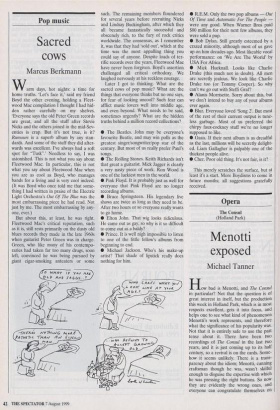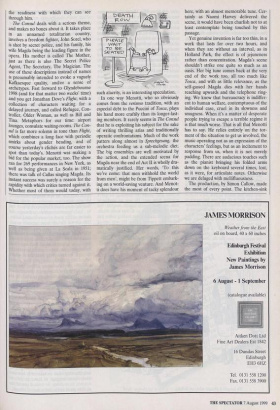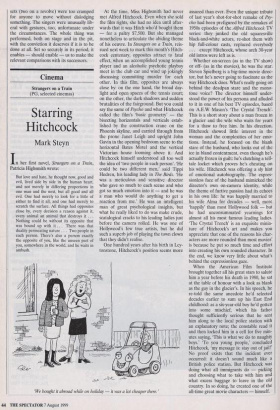Opera
The Consul (Holland Park)
Menotti exposed
Michael Tanner
How bad is Menotti, and The Consul in particular? Not that the question is of great interest in itself, but the production this week in Holland Park, which is in most respects excellent, gets it into focus, and helps one to see what kind of phenomenon Menotti's work represents, and therefore what the significance of his popularity was. Not that it is entirely safe to use the past tense about it. There have been two recordings of The Consul in the last two years, and it is just coming up to its half century, so a revival is on the cards. Some- how it seems unlikely. There is a trans- parency about the idiom; Menotti, cunning craftsman though he was, wasn't skilful enough to disguise the expertise with which he was pressing the right buttons. So now they are evidently the wrong ones, and everyone can congratulate themselves on the readiness with which they can see through him.
The Consul deals with a serious theme, and makes no bones about it. It takes place in an unnamed totalitarian country, involves a freedom fighter, John Sorel, who is shot by secret police, and his family, his wife Magda being the leading figure in the opera. His mother is called The Mother, Just as there is also The Secret Police Agent, The Secretary, The Magician. The use of these descriptions instead of names is presumably intended to evoke a vaguely Kafkaesque quality, and/or a sense of archetypes. Fast forward to Glyndebourne 1998 (and for that matter two weeks' time) and you get Jonathan Dove's Flight, with a collection of characters waiting for a delayed journey, and called Refugee, Con- troller, Older Woman, as well as Bill and Tina. Metaphors for our time: airport lounges, consulate waiting-rooms. The Con- sul is far more solemn in tone than Flight, which combines a long face with periodic smirks about gender bending, and of course yesterday's clichés are far easier to Spot than today's. Menotti was making a bid for the popular market, too. The show ran for 269 performances in New York, as well as being given at La Scala in 1951; there was talk of Callas singing Magda. Its instant success was surely a reason for the rapidity with which critics turned against it. Whether most of them would today, with such alacrity, is an interesting speculation.
In one way Menotti, who so obviously comes from the verismo tradition, with an especial debt to the Puccini of Tosca, plays his hand more craftily than its longer-last- ing members. It rarely seems in The Consul that he is exploiting his subject for the sake of writing thrilling arias and traditionally operatic confrontations. Much of the work patters along almost in Sprechgesang, the orchestra feeding us a sub-melodic diet. The big ensembles are well motivated by the action, and the extended scena for Magda near the end of Act Ills wholly dra- matically justified. Her words, 'To this we've come: that men withhold the world from men', might be from Tippett embark- ing on a world-saving venture. And Menot- ti does have his moment of tacky splendour here, with an almost memorable tune. Cer- tainly as Naomi Harvey delivered the scene, it would have been churlish not to at least contemplate being touched by this passage.
Yet genuine invention is far too thin, in a work that lasts for over two hours, and when they are without an interval, as in Holland Park, the effect is of jejuneness rather than concentration. Magda's scene shouldn't strike one quite so much as an oasis. Her big tune comes back at the very end of the work too, all too much like Tosca, and with as little relevance, as the self-gassed Magda dies with her hands reaching upwards and the telephone ring- ing. We know that bureaucracy is indiffer- ent to human welfare, contemptuous of the individual case, cruel in its slowness and smugness. When it's a matter of desperate people trying to escape a terrible regime it is that much worse. That is all that Menotti has to say. He relies entirely on the tor- ment of the situation to get us involved, the music operating not as an expression of the characters' feelings, but as an incitement to response from us, when it is not merely padding. There are audacious touches such as the pianist bringing his folded arms down on the keyboard several times, lost, as it were, for articulate notes. Otherwise we are deluged with mellifluousness.
The production, by Simon Callow, made the most of every point. The kitchen-sink sets (two on a revolve) were too cramped for anyone to move without dislodging something. The singers were unusually lib- eral with gestures, too, unfortunate under the circumstances. The whole thing was performed, both on stage and in the pit, with the conviction it deserves if it is to be done at all. Set so securely in its period, it enables — should enable — us to make the relevant comparisons with its successors.




























































 Previous page
Previous page